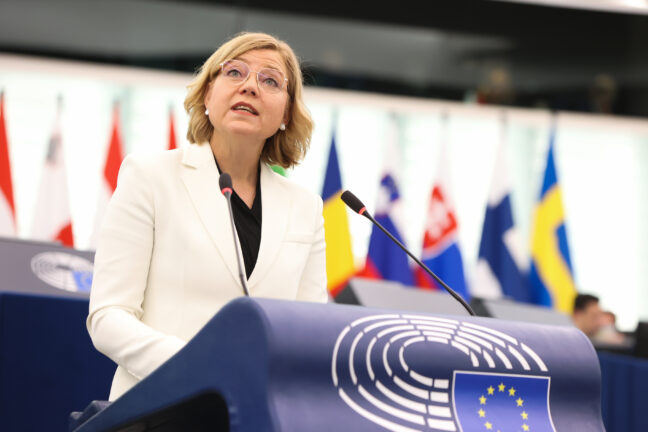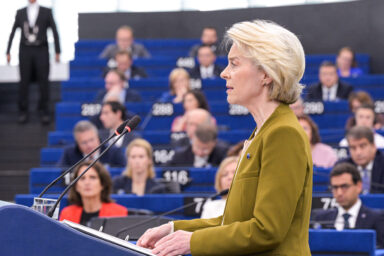The European Commission has unveiled two new major AI initiatives. Designed to accelerate the adoption of artificial intelligence across Europe’s economy and research fields, Brussels has just presented the Apply AI Strategy and the AI in Science Strategy.
Commission President Ursula von der Leyen set high ambitions for both: “I want the future of AI to be made in Europe”, she said, underlying that widespread adoption of AI is essential to “find smarter, faster, and more affordable solutions”. For the Commission president, an “AI first” mindset must go hand in hand with safety, extending across sectors from robotics and healthcare to energy and the automotive industry.
Speeding up AI adoption across key sectors
The Commission is mobilising around €1bn for the Apply AI Strategy. This allocation will be under Horizon Europe, Digital Europe Programme, EU4Health, Creative Europe and other programmes. The goal is to enhance Europe’s strategic and public sectors. This includes healthcare, pharmaceuticals, energy, mobility, manufacturing, construction, agri-food, defence, communications and culture. It will also support small and medium-sized enterprises with their specific needs and help industries integrate AI into their operations.
Some practical examples of these measures are implementing AI screening centres for healthcare. Also, the development of frontier models and agentic AI tailored to sectors like manufacturing, environment and pharmaceuticals.
With the Apply AI Strategy, we will help our companies and key sectors, from manufacturing to healthcare and the public sector, use AI to deliver real benefits for EU citizens, reinforce our competitiveness, and strengthen our technological sovereignty – Henna Virkkunen, Executive Vice-President for Technological Sovereignty
According to Executive Vice-President Henna Virkkunen, the Apply AI strategy will help companies and “deliver real benefits for EU citizens, reinforce our competitiveness, and strengthen our technological sovereignty”.
New AI bodies
To strengthen governance and coordination of the strategies, the Commission is launching the Apply AI Alliance. This will allow participants to join sectoral workflows, connect directly with decision-makers, and discuss the impacts, barriers and opportunities of specific AI solutions. In parallel, to monitor the strategy, the Commission will establish an AI Observatory. This group will monitor strategy implementation and assess AI’s impact across different sectors, monitor emerging trends, and analyse how the technology is impacting the labour market.
Moreover, to ensure smooth implementation of the AI Act, the Commission has also set up an AI Act Service Desk. This hub offers compliance tools and tailored guidance to help companies and public authorities navigate the regulation. It provides a single multilingual information platform, including interactive resources and a compliance checker to help stakeholders.
You might be interested
AI in Science
Alongside Apply AI, the Commission unveiled the AI in Science Strategy. This is designed to position the EU as a hub for AI-driven scientific innovation and research excellence. At its centre is RAISE – the Resource for AI Science in Europe, a new virtual European institute meant to “pool and coordinate key AI resources, including computational power, data, talent, and research funding.”
RAISE will empower European scientists by giving them access to essential AI infrastructure. This includes supercomputing capacity and advanced datasets to funding opportunities and talent networks. The project pilot phase will be launched at the AI in Science Summit 2025, co-organised by the European Commission and the Danish Presidency in Copenhagen in November. It accounts with €108m in preparatory funding.
Overall, the AI in Science strategy foresees €600m from Horizon Europe to expand access to AI computing power, ensuring dedicated priority to Gigafactories and EuroHPC supercomputers. In addition, €58m will be allocated to attract and retain scientific talent under the “Choose Europe” initiative. Beyond that, the Commission plans to double annual AI investments under Horizon Europe to more than €3bn.
“We will give our researchers, startups and SMEs the tools to turn ideas into breakthroughs, driving competitiveness and moving faster from lab to market.” Ekaterina Zaharieva, Commissioner for Startups, Research and Innovation
The Commissioner for Startups, Research and Innovation, Ekaterina Zaharieva, said that “with the AI in Science Strategy, Europe is taking a decisive step to stay at the cutting edge.” She added that “we will give our researchers, startups and SMEs the tools to turn ideas into breakthroughs, driving competitiveness and moving faster from lab to market”.
What’s ahead?
The two strategies build on the AI Continent Action Plan launched by the Commission in April. As part of it, the Commission plans to present a Data Union Strategy by the end of October. The aim to better align data policies with business and public needs.
The first major milestone will be the AI in Science Summit in Copenhagen on 3–4 November 2025, co-organised by the Commission and the Danish Presidency. The Copenhagen summit will mark the formal launch of the RAISE pilot and other related initiatives.











